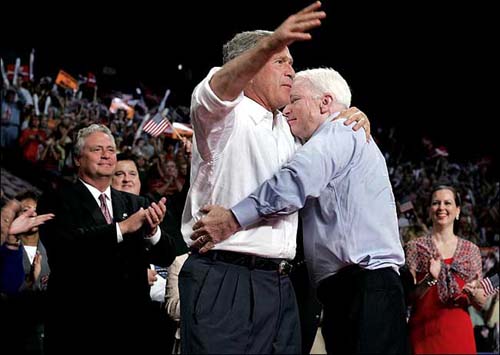That being said, the last time I wrote on this blog, the economy had not collapsed (at least anywhere near the extent to which it did a week later), McCain and Obama were still neck and neck and Sarah Palin was still being seen as a brilliant political move. Let just say since then, things have “changed.” Yes, I know that was corny but get over it.
Two weeks ago Barack Obama was sworn in as the 44th president of the United States. I don’t think that it is any shock from my past blog entries that I voted for him and was extremely proud to see him sworn in as president (both times). However the past two weeks have left me a little irked—and it’s not the problems with taxes or elusive answers that many of his cabinet and cabinet-level appointees are facing in the Senate or the GOP’s opposition to the stimulus package. Let be honest, the GOP, after getting absolutely obliterated in the election had to show some early opposition to Obama and couldn’t give him a string of huge bipartisan victories in the first few weeks he was in office. Rather it is the media, specifically the liberal media and even more specifically MSNBC that is bothering me.
 Let me preface this by saying that I have always been a fan of MSNBC. The website is my homepage and when I get home from work (on nights I don’t have class) I usually like to watch or at least listen in the background to Hardball, Countdown or Rachel Maddow when I’m making or eating dinner. In the morning I usually watch the online clips of Morning Joe when I’m at work. The network was even pretty balanced until Barack Obama declared his candidacy in the winter of 2007. After that they began the fairly rapid transformation into the Fox News of the left. They even took it a step further than Fox has done in the past as Keith Olbermann and Chris Matthews all but proposed marriage to Obama on air. Between Matthews’ comment about getting a “warm feeling go up his leg” when he hears Obama speak and Olbermann’s daily rants against the Clintons in the primaries even their NBC News colleagues like Tom Brokaw began appearing on their shows less. What’s more is that Chris Matthews seemed proud on election night and during the inauguration that the network had been so pro-Obama.
Let me preface this by saying that I have always been a fan of MSNBC. The website is my homepage and when I get home from work (on nights I don’t have class) I usually like to watch or at least listen in the background to Hardball, Countdown or Rachel Maddow when I’m making or eating dinner. In the morning I usually watch the online clips of Morning Joe when I’m at work. The network was even pretty balanced until Barack Obama declared his candidacy in the winter of 2007. After that they began the fairly rapid transformation into the Fox News of the left. They even took it a step further than Fox has done in the past as Keith Olbermann and Chris Matthews all but proposed marriage to Obama on air. Between Matthews’ comment about getting a “warm feeling go up his leg” when he hears Obama speak and Olbermann’s daily rants against the Clintons in the primaries even their NBC News colleagues like Tom Brokaw began appearing on their shows less. What’s more is that Chris Matthews seemed proud on election night and during the inauguration that the network had been so pro-Obama.That being said you would think that MSNBC would be the network most beneficial to the new administration and while you can’t say that their coverage has been anything less than flattering, I would make the argument that the network as a whole is setting the bar too high. Every time I hear the networks flowery, orchestra music come on with an announcer talking about “the first 100 days” I want to scream. (And by the way, The Huffington Post, and Politico are just as bad.) Yes the first 100 of days of a presidency are important but in reality there is only one president who had an enormously successful first 100 days—Franklin Roosevelt. Think about some of the president’s we now consider great (or even mediocre) and their first 100 days—Lincoln had to deal with the Civil War, Kennedy botched the Bay of Pigs, Clinton couldn’t get a healthcare bill off the ground, and Reagan was shot.
The network that did its best to get President Obama elected is now, seemingly unintentionally, setting the bar too high. With expectations to win two wars (and get the troops home soon), save the middle class, end Washington corruption, and create a post-partisan, kumbaya atmosphere in Washington anyone, even FDR, would fail. If MSNBC and other overtly left-leaning media outlets like The Huffington Post truly want Obama to succeed they need to tone down the Messianic rhetoric. Yes, I believe Barack Obama will bring change that is needed to this country and I love the cabinet and administration he has put together (especially now that Bill Richardson is out of the picture), but if the bar is set too high, too soon he will appear to have failed which will then lead to the actual failure of his policies. If you want a sports analogy for this look at this year’s Dallas Cowboys: They were the prohibitive favorite to win the Super Bowl at the start of the season. But the bar was set too high—the team started to flounder and injuries caused this pattern to continue. The team couldn’t live up to its hype and fell apart from the inside out. If the media doesn’t tone down expectations for Obama, I fear the same will happen to his administration.







